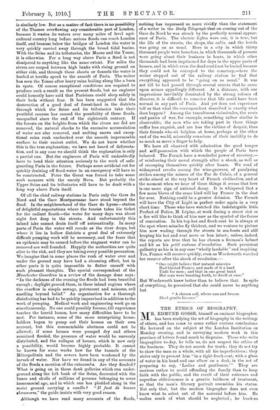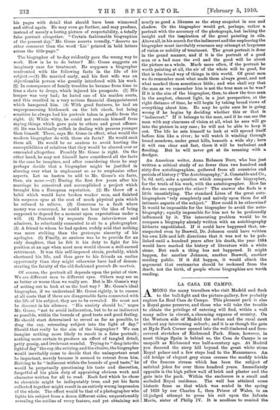THE ETHICS OF BIOGRAPHY.
MR. EDMUND GOSSE, himself an eminent biographer, has been studying the art of biography in the writings of others, and has come to some rather curious conclusions, He lectured on the subject at the London Institution on Monday evening, and in surveying modern work in this province of letters found much to dispraise. Those who write biographies to-day, he tells us, do not respect the ethics of the business. They do not search for truth ; they do not try to show the man as a whole, with all his imperfections ; they strive only to present him "in a tight frock-coat, with a glass of water in his hand and one elbow on a desk, in the act of preparing to say, Ladies and gentlemen." They are anxious rather to avoid offending the family than to keep faith with the public, and the result of their reticence and superfine obliviousness is a granite baldness of treatment, so that the man's literary portrait resembles his statue. Not only that, but the modern biographer does not even know what to select out of the material before him. He makes much of what should be neglected ; he burdens
his pages with deta.:1 that should have been winnowed and sifted again. He may even go further, and may produce, instead of merely a boring picture of respectability, a totally false portrait altogether. "Certain fashionable biographies of the present day," Mr. Gosse asserts roundly, "deserve no other comment than the word 'Lie' printed in bold letters across the title-page."
The biographer of to-day evidently goes the wrong way to work. How is he to do better Mr. Gosse suggests an imaginary case for treatment. He supposes a biographer confronted with the following facts in the life of his subject :—(1) He married early, and his first wife was an 510jectionable person who greatly interfered with his work. (2) In consequence of family troubles he became from time to Lime a slave to drugs, which injured his prospects. (3) His temper was very bad; he bated one of his maiden aunts, and this resulted in a very serious financial disappointment which hampered him. (4) With good features, he had an unprepossessing birthmark on the left cheek, but being sensitive he always had his portrait taken in profile from the right. (5) While witty, he could not restrain himself from 'Saying things which gave pain to others and great offence. (6) He was habitually selfish in dealing with persons younger than himself. There, says Mr. Gosse in effect, what would the modern biographer do with those six facts He would omit them all. He would be so anxious to avoid hurting the susceptibilities of relatives that they would be slurred over or concealed altogether. Possibly Mr. Gosse is right. On the other hand, he may not himself have considered all the facts in the case he imagines, and after considering them he may perhaps decide that a biographer might be justified in slurring over what is unpleasant so as to emphasise other aspects. Let us hasten to add to Mr. Gosse's eix facts, then, six more :—(1) During the first few years after his marriage he conceived and accomplished a project which brought him a European reputation. (2) He threw off a habit which would have broken weaker men, and finished his magnum opus at the cost of much physical pain which he refused to relieve. (3) Generous to a fault where money was concerned, he could not bear the idea of being supposed to depend for a moment upon expectations under a will. (4) Pestered by requests from interviewers and admirers, he reluctantly consented to sit to a photographer. (5) A friend to whom he had spoken rudely said that nothing was more striking than the grotesque sincerity of his apologies. (6) Finally, so anxious was he to provide for an only daughter, that he felt it his duty to fight for his position at an age when most men would choose a well-earned retirement. It was this self-imposed strain, probably, which shortened his life, and thus gave to his friends an earlier opportunity than they might otherwise have had of demon- strating the fatuity of the old-fashioned proverb De mortuis.
Of course, the portrait all depends upon the point of view. We are different men to different eyes. Others may see us as better or worse than we really are. But is Mr. Gosse's way of setting out to look at us the best way ? Mr. Gosse's ideal biographer, if we understand Mr. Gone rightly, is to ensure at all costs that if there are disagreeable facts connected with the life of his subject, they are to be revealed. He must not be discreet in his silences. "His anxiety should be," urges Mr. Gosse, "not to avoid indiscretion, but to be as indiscreet as possible, within the bounds of good taste and good feeling. He should start determined to reveal as far as possible, to drag the coy, retreating subject into the light of day." Should that really be the aim of the biographer? We can imagine nothing more likely to result in a false portrait ; nothing more certain to produce an effect of tangled detail, petty gossip, and irrelevant scandal. Trying to " drag into the light of day" the coy, the retiring, and the elusive, the biographer would inevitably come to decide that the unimportant must be important, merely because it seemed to retreat from him. Striving to be "indiscreet within the bounds of good taste," he would be perpetually questioning his taste and discretion, forgetful of his plain duty of appraising obvious work and character written for all to read. Each fact which he chose .to chronicle might be indisputably true, and yet his facts 'collected together might result in an entirely wrong impression of the whole. The effect would be that of a photographer who lights his subject from a dozen different sides, unquestionably revealing the outline of every feature, and yet obtaining not nearly so good a likeness as the stray snapshot in sun and shadow. Or the biographer would get, perhaps, rather a. portrait with the accuracy of the photograph, but lacking the insight and the inspiration of the great painting in oils. Above all, in his search for the indiscreet and the =pleasing the biographer must inevitably renounce any attempt at largeness of vision or nobility of treatment. The great portrait is done in the grand manner, and if it is the portrait of a good man or a bad man the evil and the good will be about the picture as a whole. Much more often, if the portrait be worth painting at all, the air of the -whole will be good, for that is the broad way of things in this world. Of great men we do remember most what made them always great, and not what marked them sometimes little ; and who shall say that the man as we remember him is not the true man as he was ? If it is the aim of the biographer, then, to show the true man in the amplest, clearest light, in a just perspective, at the right distance of time, he will begin by taking broad views of everything about him. He may be quite sure he is going wrong if he begins by deciding whether this or that is "indiscreet." If it belongs to the man, and if he can see the man with any clearness of vision at all, what he sees will go into the picture in any case ; he will not be able to keep it out. The life he sets himself to look at will spread itself before him like a river; he will watch it winding through broad meadows, under great hills, beneath a wide sky ; here it will run clear and fast, there it will be turbulent and flooding. But he will never get at its meaning with a dredger.
An American writer, Anna Robeson Burr, who has just written a critical study of no fewer than two hundred and sixty-five autobiographies, gathered from all countries and periods of history ("The Autobiography," A. Constable and Co., 7s. 6d. net), asks a question which compares the biographer, for the truth of his work, with the autobiographer. How far does the one support the other ? The answer she finds is a little unsatisfying. The standard Lives of the great auto- biographers "rely completely and naively upon them for all intimate aspects of the subject." How could it be otherwise? It would be impossible for the biographer to avoid the auto- biography; equally impossible for him not to be profoundly influenced by it. The interesting problem would be to compare a biography already written with an autobiography hitherto unpublished. If it could have happened that, un- suspected even by Boswell, Dr. Johnson could have written his own Life and left directions that it was not to be pub- lished until a hundred years after his death, the year 1884 would have marked the history of literature with a white stone. But such a thing has not - happened. It might happen, for another Johnson, another Boswell, another reading public. If it did happen, it would clinch the argument that centenaries should be reckoned from the death, not the birth, of people whose biographies are worth reading.











































 Previous page
Previous page